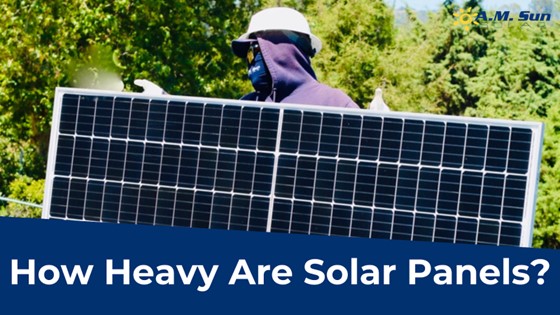Solar panels, also known as photovoltaic (PV) panels, are an increasingly popular way for homeowners and businesses to generate their own electricity and reduce their dependence on fossil fuels. However, one question that often comes up when considering solar panels is: How heavy are they?
Consider More Than Just Solar Panels
The weight of a solar panel can vary depending on the specific type and model, as well as the size and number of panels being installed. On average, a standard solar panel weighs between 40 and 60 pounds. This means a typical residential solar panel installation—which consists of around 20 to 30 panels—would weigh between 800 and 1,800 pounds.
It’s important to note that the weight of a solar panel is not just limited to the panel itself, but also includes the framing, mounting hardware, and other associated equipment. In total, a solar panel system can weigh anywhere from 1,500 to 4,000 pounds, depending on the size of the system and the type of mounting system used.
Solar panels are designed to be durable and long-lasting because they are made from tempered glass and aluminum, which are both strong and lightweight materials. Additionally, they are built to withstand extreme weather conditions, such as high winds and heavy snow loads.
Roof-Mounted Versus Ground-Mounted Solar Panels
When it comes to installation, the weight is not usually a problem as the panels are typically mounted on the roof, which is designed to support the weight. However, if the roof is not strong enough to support the weight of the solar panels, additional structural support may be needed. This is something the experts at A.M. Sun Solar take into consideration during the planning and design phase of our installations.
Of course, the weight of solar panels is not the only factor we consider. The size and number of panels, as well as the type of mounting system used, can also affect the overall weight of the system. For example, a ground-mounted solar panel system will typically weigh more than a roof-mounted system because it requires additional equipment, such as a foundation and racking system.
Ground-mounted solar panels, also known as ground-based solar arrays, are solar panels that are installed on the ground rather than on a roof. The weight of ground-mounted solar panels can vary depending on the specific type and model, as well as the size and number of panels being installed.
The foundation and racking system used for ground-mounted solar panels can add considerable weight to the overall system. For example, a concrete or steel racking foundation can add several hundred or thousands of additional pounds. This means that a ground-mounted solar panel system can weigh anywhere from 2,000 to 6,000 pounds or more, depending on the size of the system and the type of foundation and racking used.
It’s important to note that when installing ground-mounted solar panels, the weight is a critical factor to consider, as it can affect the stability of the system and the safety of installation. Also check the zoning laws and regulations that apply in your area, as they can have an impact on the installation of a ground-mounted solar panel system, including weight restrictions.
Final Thoughts
In conclusion, solar panels are not as heavy as one might think, but you have to account for the total weight of the system when planning and designing a solar panel installation. Installing panels for your home or business is a great investment-just make sure you work with a company you know will do a quality job that will last you for years to come!
Ready to make the switch to solar energy? Fill out the form below to get a FREE on-site consultation with one of our friendly solar experts.


